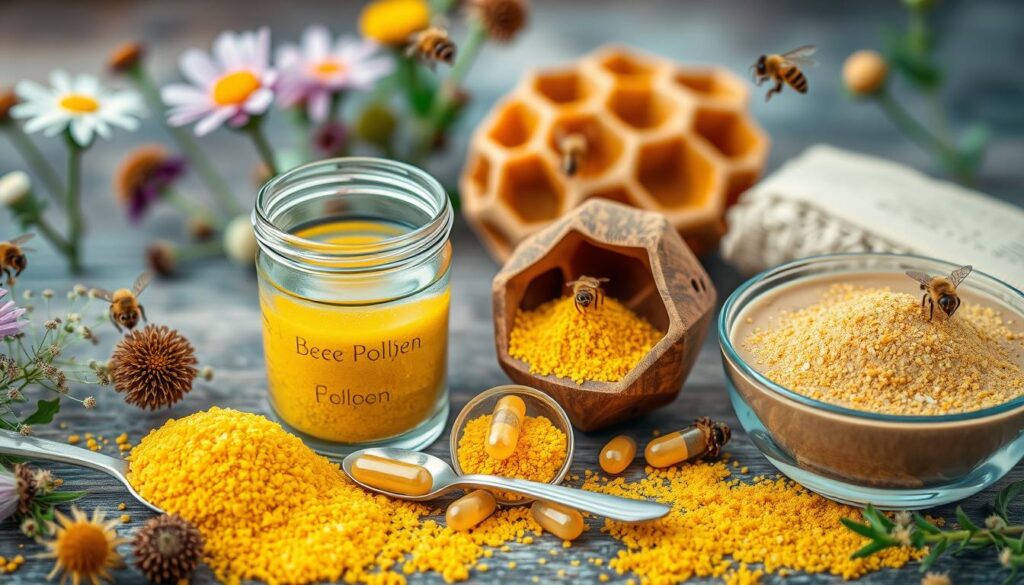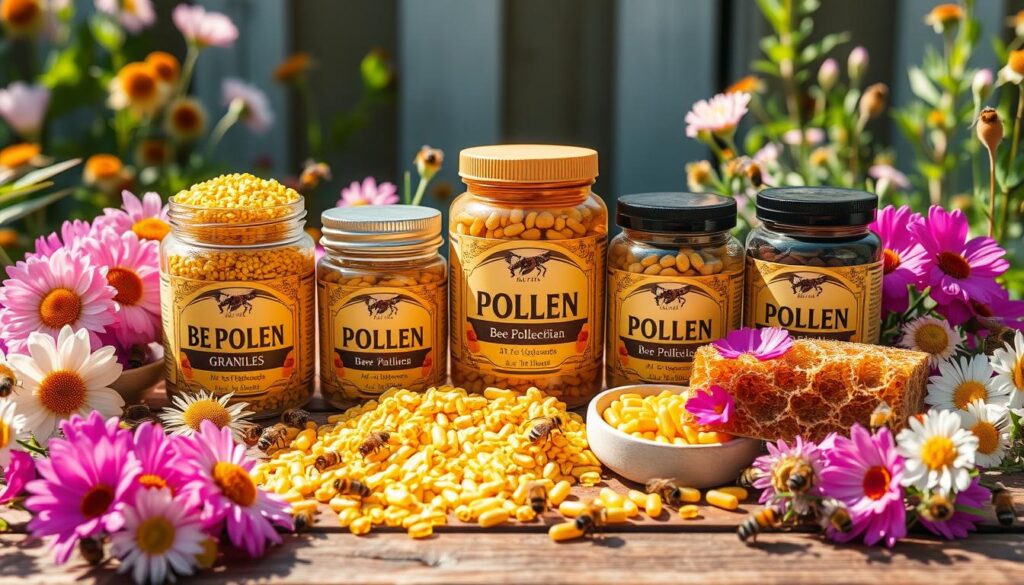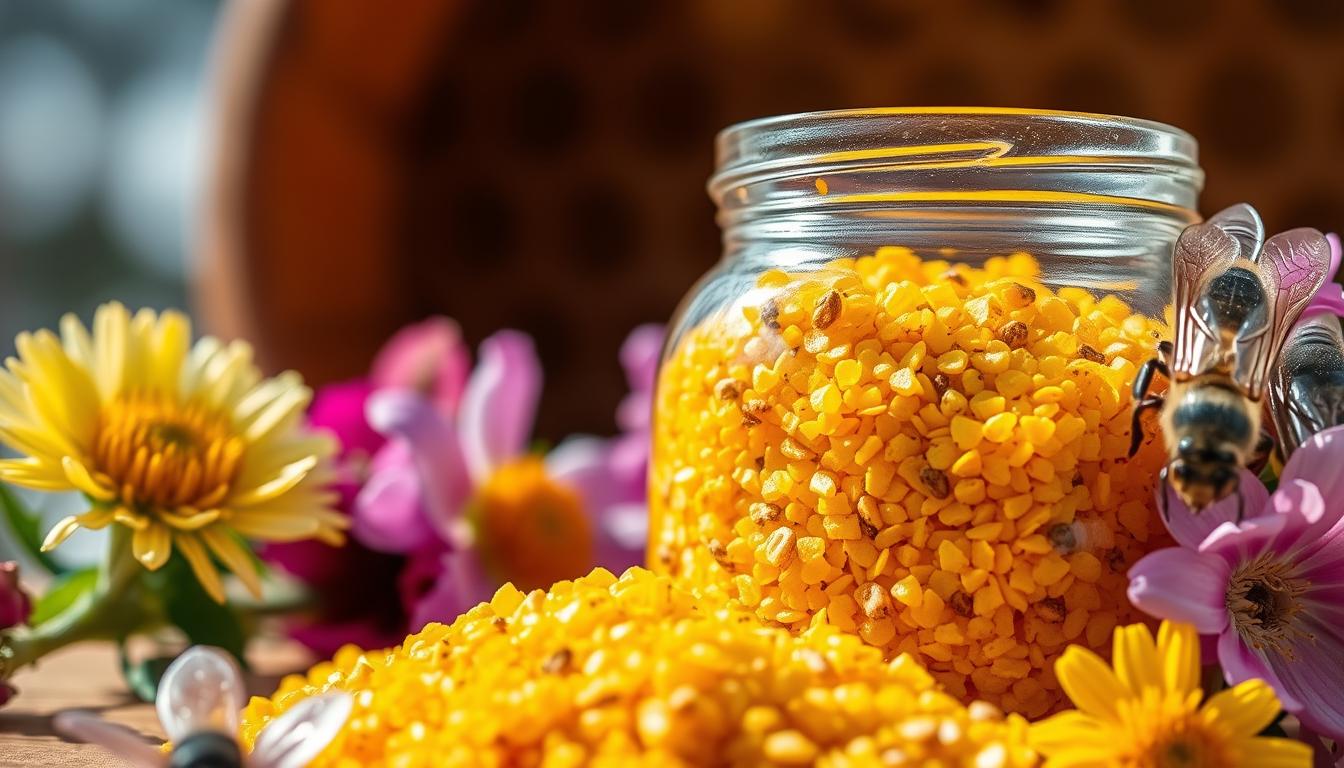Many ancient remedies are coming back into the spotlight, with bee pollen leading the way. It’s full of vitamins, minerals, and antioxidants. The benefits of bee pollen are many, from boosting your immune system to helping with digestion. We’ll explore the bee pollen nutrition facts and see how it can make you healthier.
Key Takeaways
- Bee pollen is a natural substance with a high nutritional value, contributing to overall health enhancement.
- Understanding the benefits of bee pollen can influence one’s approach to diet and wellness.
- Incorporating bee pollen into the diet may bolster immunity and increase energy levels.
- Learning about bee pollen nutrition facts helps in making informed decisions about supplement intake.
- An exploration of bee pollen will reveal its multifaceted role in both traditional and modern medicinal practices.
What is Bee Pollen?
Bee pollen is a fascinating part of nature, often seen as a by-product of honey making. But it’s much more than that. It’s packed with nutrients and is considered one of the most complete foods in nature. Bees collect it from flowers and use it as their main food in the hive.
Defining Bee Pollen
Bee pollen is made up of tiny granules. These granules have pollen, nectar, enzymes, honey, wax, and bee secretions. It’s not just pollen from plants. It’s a mix of different things that bees collect, making it a key food source for them.
Each batch of bee pollen is unique. It changes depending on the flowers the bees visit.
The Collection and Formation Process
Bees collect pollen as they move from flower to flower. They add their saliva, which has digestive enzymes, to the pollen. This helps break down the pollen. Then, they pack it into pellets with their legs and take it back to the hive.
Components of Bee Pollen
Bee pollen is full of nutrients important for health. It has vitamins, minerals, carbs, fats, and proteins. Enzymes and co-enzymes are also key. Each granule has almost all the nutrients humans need.
- Vitamins such as B1, B2, B6, C, and E
- Minerals including magnesium, calcium, potassium, and zinc
- Proteins and amino acids
- Fatty acids
- Enzymes and antioxidants
This mix of nutrients makes bee pollen very valuable for health. It can boost energy, fight inflammation, and strengthen the immune system.
The Nutritional Profile of Bee Pollen
Exploring bee pollen nutrition facts shows us a superfood packed with nutrients crucial for good health. It’s full of vitamins, minerals, amino acids, and enzymes. These nutrients support overall health.
Bee pollen is known for its health benefits. It’s a key part of dietary supplements. Let’s look at the main parts that make it so good.
| Nutrient | Type | Benefits |
|---|---|---|
| Vitamins B1, B2, B3, B5, B6, C, D, E | Vitamins | Boosts energy, helps skin health, and strengthens the immune system |
| Calcium, Magnesium, Potassium, Zinc | Minerals | Good for bones, nerves, and cell health |
| Phenylalanine, Leucine, Valine | Amino Acids | Helps build protein and recover muscles |
| Diastase, Phosphatase, Amylase | Enzymes | Improves digestion and helps absorb nutrients |
Learning about bee pollen nutrition facts shows its wide role in diet. It also points out the health perks of bee pollen. This makes it popular among health lovers. Each part is key to staying healthy and avoiding nutritional gaps.
Top Health Benefits of Bee Pollen
Discover the amazing health perks of bee pollen, a natural treasure bees collect. It’s packed with benefits for our health, from boosting immunity to increasing energy. Let’s look at how it can help us.
Boosting Immunity with Bee Pollen
Bee pollen is a powerhouse for the immune system. It’s full of antioxidants, vitamins, and minerals that make our immune system stronger. Eating bee pollen regularly can help protect us from infections and diseases. It’s a key part of staying healthy.
Bee Pollen’s Impact on Allergies
Bee pollen is great for fighting allergies. It can lessen our sensitivity to allergens by boosting the immune system. Many people find their allergy symptoms lessen during pollen season when they take bee pollen for allergies.
Energy-Enhancing Properties
Want more energy the natural way? Try bee pollen. It’s loaded with B-vitamins and amino acids that boost stamina and fight fatigue. Athletes and fitness lovers use it to stay energized and avoid the energy dips from other boosters.
Supporting Digestive Health
Bee pollen is also good for our digestive health. It helps keep the gut balanced, improving digestion and nutrient absorption. It can also lessen inflammation in the gut, making our digestive system healthier.
| Health Benefit | Description |
|---|---|
| Immune System Support | Strengthens immune defenses, rich in antioxidants. |
| Allergy Relief | Reduces allergy symptoms, modifies immune response to allergens. |
| Energy Boost | Enhances physical and mental energy naturally, provides stamina. |
| Digestive Health | Supports gut flora, aids in nutrient absorption, and reduces inflammation. |
How to Take Bee Pollen
Knowing how to take bee pollen is key to getting its health benefits. Here’s a simple guide to start:
- Direct Ingestion: Eating bee pollen granules is easy. Start with a small amount (like a teaspoon) to avoid any bad reactions.
- Dissolve in Beverages: Mix bee pollen in water, juice, or a smoothie. This way, you can avoid the strong taste and easily add it to your diet.
- Mix with Food: Add bee pollen to yogurt, cereal, or salads. It blends well and adds nutrients without changing the taste too much.
Here are tips for the right bee pollen dosage:
- Start with a small amount to see how your body reacts.
- Slowly increase the amount as you get used to it.
- Talk to a doctor to find the best amount for your health needs.
Bee pollen is full of vitamins, minerals, and proteins. But, it’s important to follow the recommended amounts to avoid side effects. Here’s a simple table to help beginners on how to take bee pollen:
| Method | Recommended Dosage | Notes |
|---|---|---|
| Direct Ingestion | 1-2 teaspoons daily | Start small and increase gradually. |
| In Beverages | 1 teaspoon per glass | Mix thoroughly before consumption. |
| With Food | 1-2 teaspoons daily | Ideal for adding to meals or snacks. |

Adding bee pollen to your diet with the right bee pollen dosage can boost your health. Always choose high-quality bee pollen from trusted sources for the best results.
Bee Pollen in Traditional and Modern Medicine
Bee pollen has a long history, impacting both traditional and modern medicine. Its use today shows its lasting value in natural health and modern treatments.
Ancient Practices and Bee Pollen
Around the world, bee pollen has been a key part of many cultures. The ancient Egyptians and Chinese used it to boost energy and extend life. The Greeks and Romans saw it as a healing agent.
They called it ‘life-giving dust’. This shows its big role in old diets and medicines.
Bee Pollen in Contemporary Health Discussions
Today, bee pollen is still being studied for its health benefits. Experts look at how it can help the immune system, treat allergies, and support heart health. This shows how old knowledge and new science work together to understand bee pollen’s health perks.
The table below shows how bee pollen helps, based on old wisdom and new research:
| Benefit | Description in Traditional Medicine | Research Findings in Modern Medicine |
|---|---|---|
| Immune Support | Used to bolster longevity and resilience. | Shown to enhance the body’s immune response. |
| Allergy Relief | Applied as a natural remedy for respiratory issues. | Identified for its potential to reduce allergic reactions. |
| Anti-inflammatory | Heralded for its soothing properties on various ailments. | Research confirms its effectiveness in reducing inflammation. |
| Antioxidant | Touted for its anti-aging effects. | Proven to combat oxidative stress in cells. |
This mix of old knowledge and new science helps us see how bee pollen fits into today’s health plans.
Comparing Bee Pollen Supplements
Choosing the right bee pollen products is key to getting quality and effective supplements. This section will cover important factors to think about. It will also explain how to read labels and understand where they come from.
Factors to Consider When Choosing Supplements
When picking bee pollen supplements, keep these key points in mind for a strong and clean product:
- Purity: Make sure the bee pollen is clean from harmful substances.
- Potency: The strength of bee pollen is crucial, and it should be clearly listed.
- Source: Where the bee pollen comes from can change its benefits.
- Processing Methods: Choose bee pollen that is processed little to keep its natural benefits.
- Third-party Testing: Find products tested by outside groups to check their quality.
Understanding Labels and Origins
Labels on bee pollen tell you a lot about where it comes from and its quality. Here’s what to look for:
- Check for certifications like organic or non-GMO to show quality standards.
- Look at the country of origin since different places can change the bee pollen’s nutrition.
- Make sure the ingredient list doesn’t have any extra additives.
By focusing on these points when picking bee pollen products, you can make choices that meet your health needs.
Integrating Bee Pollen Into Your Diet
Exploring how to use bee pollen in everyday dishes can boost your nutrition and taste. It’s easy to add to your meals, whether you’re a pro in the kitchen or just starting out. Adding bee pollen to your diet is simple and can be very beneficial.
Simple Ways to Consume Bee Pollen
- Sprinkle over breakfast cereals or yogurt for a nutritious start to your day.
- Blend it into smoothies or shakes for an extra health kick.
- Use it as a topping on salads or desserts to add a subtle sweetness and texture.
Recipes Featuring Bee Pollen
For those looking for bee pollen recipes, here are some ideas that highlight this superfood:
- Bee Pollen Energy Bars: Great for quick snacks, packed with seeds, nuts, and honey.
- Blueberry and Bee Pollen Muffins: A tasty treat that mixes blueberries’ antioxidants with bee pollen’s protein.
- Citrusy Bee Pollen Dressing: A tangy, nutritious dressing for salads.
| Recipe Name | Ingredients | Preparation Time |
|---|---|---|
| Bee Pollen Energy Bars | Oats, honey, bee pollen, assorted seeds, and nuts | 15 mins |
| Blueberry and Bee Pollen Muffins | Whole wheat flour, fresh blueberries, bee pollen, eggs, milk | 25 mins |
| Citrusy Bee Pollen Dressing | Olive oil, lemon juice, bee pollen, mustard, honey | 10 mins |
The Best Bee Pollen Products on the Market
Finding the best bee pollen products means looking at reviews and doing deep research on brands and purity. We’ll explore top-rated bee pollen products that are known for their quality and effectiveness.

When looking for the best bee pollen, consider where it comes from, how it’s made, and if it’s certified pure and organic. Here’s a list of top-rated bee pollen options that are leaders in quality and trustworthiness.
- Nature’s Bounty Bee Pollen Complex – This product is special because it mixes bee pollen with vitamins and other natural stuff, making it more nutritious.
- Greenbow Organic Bee Pollen – It’s certified organic, non-GMO, and gluten-free. Greenbow’s bee pollen is made responsibly and is pure and natural.
- YS Eco Bee Farms Bee Pollen – Health lovers love YS Eco Bee Farms for their 100% pure, fresh, and unprocessed bee pollen granules. They keep all their natural goodness.
- Bee Pollen by Xtend-life – Harvested in New Zealand’s clean environments, this product is very potent because it’s naturally extracted.
These products are not just top-rated bee pollen supplements. They’re also praised for being open about their ingredients and ethical sourcing. Adding these products to your diet means you get the most benefits from bee pollen.
“Purity and ethical sourcing are key when choosing the best bee pollen products. This ensures that you’re not only supporting sustainable practices but also receiving the full health benefits.”
Choosing a top-rated bee pollen product is key to getting the most health benefits and supporting brands that are good for the planet and fair to workers. These products have set a high standard in the industry for quality and results.
Organic Bee Pollen: Is it Worth the Hype?
Organic bee pollen is getting more popular, but is it really better? Let’s look into why many choose organic and how it’s made differently.
Benefits of Choosing Organic
Choosing organic bee pollen is good for your health and the planet. A big plus is that it doesn’t have synthetic pesticides or fertilizers. This means you get a cleaner product. Plus, you’re supporting farming that keeps the soil and nature in balance.
- Better for the environment – reduces chemical runoff and soil degradation
- Healthier – minimizes exposure to synthetic substances
- Supports ethical farming practices that focus on sustainability
How Organic Bee Pollen is Harvested
Harvesting organic bee pollen follows strict rules. Beekeepers use natural ways to keep bees healthy. They make sure the plants bees pollinate are organic. This means they have more control over the bees’ environment.
This careful way of harvesting makes sure the pollen is pure and full of nutrients. So, organic bee pollen usually has more good stuff than non-organic types.
In the end, picking between organic and non-organic bee pollen might seem small to some. But the benefits of organic bee pollen for your health and the planet are big.
Precautions and Recommended Bee Pollen Dosage
When adding bee pollen to your health routine, it’s key to know the right amount and possible side effects. Bee pollen is packed with health benefits, but it should be taken with care. Always use it responsibly.
Understanding the Correct Dosage
The right bee pollen dosage depends on your age, health, and sensitivities. Start with a small amount, like half a teaspoon daily. Then, you can slowly increase it to one or two teaspoons if needed. Always watch how your body reacts and adjust the amount as necessary.
Possible Side Effects and Interactions
Bee pollen is natural but can cause side effects of bee pollen. If you’re allergic to pollen, you might have an allergic reaction. Symptoms include itching, swelling, shortness of breath, or even anaphylaxis in severe cases. It can also affect people taking certain medications, like blood thinners or immune-suppressing drugs. Always talk to a healthcare provider before starting bee pollen, especially if you’re on medication or have health issues.
Here is a helpful table summarizing who might consider taking bee pollen, along with the cautionary points regarding its dosage and potential interactions:
| Group | Recommended Starting Dosage | Considerations/Precautions |
|---|---|---|
| Adults with no pollen allergies | 1/2 tsp daily | Monitor for any adverse reactions |
| Adults with pollen allergies | Consult a healthcare provider | Potential severe allergic reactions |
| Individuals on medication | Consult a healthcare provider | Possible interactions with medications |
Conclusion
We’ve looked into bee pollen and found many benefits for our health. It’s full of vitamins, minerals, and antioxidants. These help our immune system, digestion, and keep us feeling alive.
Bee pollen is like a superfood made by bees. It can add to a healthy diet and lifestyle. But, it’s important to choose wisely when adding it to your daily routine.
When picking bee pollen, look for quality sources. Make sure the product is pure and comes from trusted suppliers. Organic options are best to get the most benefits.
Remember, follow the recommended amount and be aware of any side effects. Bee pollen is great for health, but use it safely. By doing so, it can really help improve your overall wellness.
Using natural supplements like bee pollen can make you healthier. It’s a key part of living a vibrant, health-focused life.

